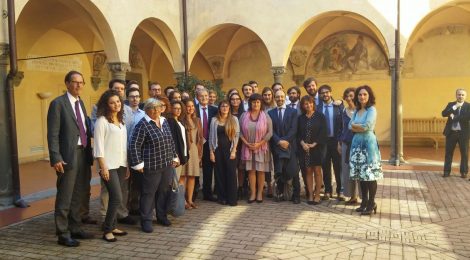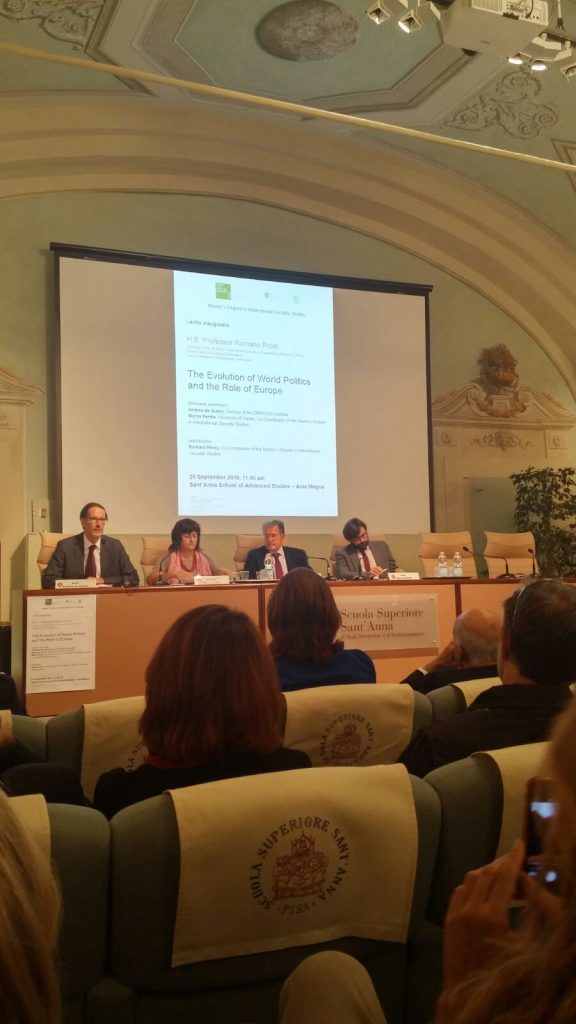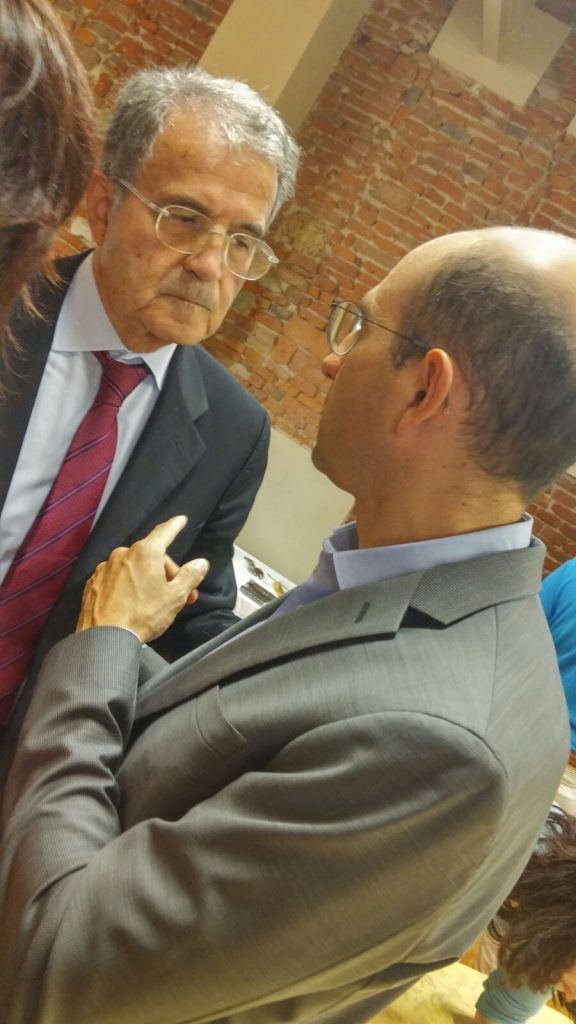
Launch of MISS: Romano Prodi’s lectio magistralis about world politics cannot but mention China
On September 26, the new master’s degree course in International Security Studies (MISS) promoted by Sant’Anna School Dirpolis Institute in partnership with the School of International Studies of University of Trento was presented in Pisa. The inauguration of the course saw the presence of Romano Prodi, world-wide famous statesman, political leader and intellectual, former Head of the Italian Government and former president of the European Commission, who delivered a lectio magistralis on world politics and Europe’s international role.
The new joint Master of Science in International Security is to start this autumn and will involve different disciplinary areas including economics, law, international relations and political science, political philosophy, history and sociology. In the words of the director of Dirpolis Institute, Andrea de Guttry, MISS aims at preparing the future leadership to be able to take properly informed decisions under new challenges and ever changing conditions, facing the fast-paced reality of 21st century, where actions must be taken in very short time.

Sant’Anna School’s professor of political philosophy and co-director of MISS, Barbara Henry, highlighted that, in times of uncertainty as the ones we are currently experiencing, with doubts about the stability and the future of the European Union, questions arise about the meaning of the EU and of its political texture, about EU’s leaders and bodies, and the role they can play at the beginning of this 21st century. The European Institutional set is in search of a new political identity in a world where no trace is shown of the emergence of a cosmopolitan order. Economy deeply influences the evolution of international politics, therefore we cannot but remember one of the historical achievement of president Prodi, it being the Italian access to the Monetary Union.
Another recent event mentioned at the opening ceremony of MISS is the decision of the International Monetary Fund to include the Chinese renminbi, RMB, in its basket of reserve currencies or special drawing rights’ basket (SDR), alongside with US dollars, the euro, the pounds sterling, and the Japanese yen. The upgrade of the renminbi to the SDR status gives a symbolic boost to the currency’s global standing, and it is expected to bring practical consequences: more resources to flow from central banks and sovereign funds to the Chinese currency, and the renminbi to enlarge its presence in official reserves and exchanges at international level. This will also influence China’s paradox of being the world’s n° 2 economic power, yet with a currency which is world’s n° 7 for volume of exchanges.
In his lectio, Mr Prodi also talked about China’s role in today’s power relations. There has been a shift of the attention from the Atlantic to the Pacific, with someone calling it an “obsession for China.” China has been the focus of analysis of many political scientists, even if the majority of today’s problems for the Western world are now linked to the areas of Middle East and the Mediterranean.
In fact, China is the new factor in the game, and not exclusively for its impressive growth rate. China is expected to become of crucial importance in the field of science and technology. The Middle Kingdom has come back to the world stage again, with a completely different strategy from the one of the Chinese empire of 16th century, when China and Tuscany were the wealthiest place on the globe. The new China is different – Mr Prodi highlighted – it is the first time in history that a country operates in the world economy with both goods and people: selling goods, exporting people, technology and
capital all together, at the same time, and on world scale.
We cannot deny that China has numerous domestic issues to deal with, these including banks and financial stability, overproduction in many traditional sectors, power struggle within the Chinese communist party, endemic corruption, severe demographic problems. To face all these challenges, Chinese leaders chose to concentrate political power – Mr Prodi continued. In 2016, China is more centralised than in the post-Mao period: party, army, government are strictly controlled.
deny that China has numerous domestic issues to deal with, these including banks and financial stability, overproduction in many traditional sectors, power struggle within the Chinese communist party, endemic corruption, severe demographic problems. To face all these challenges, Chinese leaders chose to concentrate political power – Mr Prodi continued. In 2016, China is more centralised than in the post-Mao period: party, army, government are strictly controlled.
An effective instrument for power control for the Chinese Communist Party is the anti-corruption campaign which is currently taken forward countrywide. China is also showing a more assertive foreign policy, which takes shape in the Asian Infrastructure Investment Bank and in the New Silk Road strategy, which historically connected Asia with Europe, but whose present most immediate effects are seen in the building of new harbours and road linking Eastern Chinas to Western Europe. Chongqing represents a key node is China’s “go west policy,” as it is located on one of the main route forward Europe, and attracts national funds and international investments. At the end of the inauguration, Mr Prodi briefly talked with Galilei Institute’s Director, prof Di Minin, about Chongqing and the important role of Sant’Anna School can play in this key area.
In the evolution of mankind, the core economic and political centres are the new networks, just as the caravels were after the discovery of America. Google and Baidu, eBay and Alibaba: the new driving forces of the world are all American and Chinese. How will Italy have a say in the future if not as part of a larger European entity?




